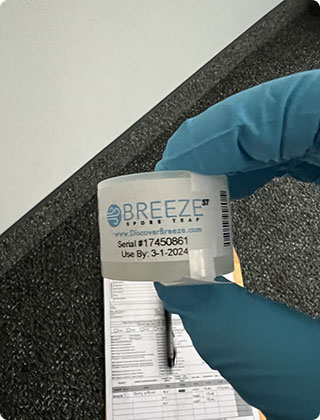MENU


When it comes to healthcare, the patients' and staff's safety is always the most important thing. But there is a threat that is hard to see that often goes unnoticed in hospital settings: mold. Mold problems in healthcare buildings can be bad for your health, so it's important to know the risks of being exposed to mold.
Today, we're going to talk about mold in hospitals, the health risks it poses, how to spot common mold types, and why regular mold testing in Baltimore, MD, is important. We will also talk about how to test for mold in hospitals and why it is important to hire skilled mold testing services. Last but not least, we'll talk about ways to stop mold growth and keep patients and workers safe.
As a type of fungus, mold grows best in damp and damp places. With all the moisture that is always present, healthcare buildings are perfect places for mold to grow. It's not just an eyesore when there's mold in hospitals; it can also cause serious health problems. But how does mold get into places like hospitals in the first place?
Microspores of mold are very small and can easily get into hospitals through airflow, staff, and visitor clothing, and even tools and supplies. Indoor mold can grow on walls, ceilings, rugs, and even medical equipment once it gets inside.
Mold could make you sick. The answer is yes, which is a shame. Mold can cause a lot of health issues, especially in people whose immune systems aren't strong enough, like hospital patients. Some of the health risks that come with being around mold are:
In healthcare situations, you can often find a few common types of mold. Aspergillus, Penicillium, Cladosporium, and Stachybotrys are some of these. All of these germs can be harmful to your health, so they need to be removed right away.
Lung diseases can be caused by Aspergillus, especially in people whose immune systems aren't working well. Penicillium and Cladosporium can make breathing problems and allergens worse. Stachybotrys, which is sometimes called "black mold," produces mycotoxins that can be very bad for your health if you don't get rid of them quickly.
Regular mold testing is necessary in Baltimore, MD, hospitals to protect patients and workers from the health risks that come with being around mold. Mold is often hidden behind ceilings or walls, so it's hard to see with the naked eye. To make sure that the risks are minimized as soon as possible, professional mold testing companies can find mold even when it's not obvious.
To get a full picture of mold problems in healthcare facilities, testing must be done in a number of steps. Among these steps are:
Because checking for mold can be dangerous to your health and is very technical, hospitals in Baltimore, MD, should hire mold testing experts. Professionals with a lot of experience have the skills and tools to do thorough mold exams. They can also give you expert advice on how to get rid of mold and keep it from coming back.
Stopping mold from growing is always cheaper and less of a hassle than getting rid of an infestation. Here are some things hospitals can do to keep mold from growing:
It is very important to keep patients and workers in healthcare facilities safe from mold-related health risks. It is very important for people working in hospitals in Baltimore, MD, to know that mold is present that it can be harmful to health, and that annual mold testing is necessary.
Hospitals can make sure everyone is safe and healthy by getting professional mold testing services and taking other precautions. Do something about mold right away before it gets worse. Take steps to protect the health of the people who depend on your healthcare center.
Get in touch with O2 Mold Testing of Baltimore right away for professional mold testing. You should only give your patients and staff the best in terms of safety and level of care.